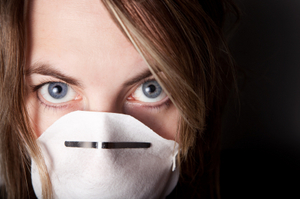Less than 48 hours after my husband flew home from a winter wedding in another state, he developed serious respiratory symptoms. After a diagnosis of pneumonia, he missed two weeks of work. Initially, we weren’t particularly worried about the exact type. However, when doctors discovered that I took immunosuppressive drugs and wasn’t permitted to have the pneumonia vaccine, they became concerned about which of the types I might contract from him. It’s a widespread misconception that there are only two types of pneumonia: bacterial and viral.
What is Pneumonia?
Pneumonia, an inflammation of the lungs, usually has one of several causes, according to the Mayo Clinic. The typical culprits are bacteria, infection, viruses, parasites and fungi.
Sometimes pneumonia is a complication of another illness, like influenza. Cases range from mild to life-threatening. The recent development of resistance to a number of antibiotics that treat bacterial pneumonia is a major concern among health care providers.
Doctors classify pneumonia into a number of types. Knowing the type is important for identifying the most appropriate treatment.
Bacterial Pneumonia
It occurs frequently and is caused by bacteria. Among them, Streptococcus pneumonia is the most common bacterium, health-cares.net reports. This type of pneumonia usually befalls an individual who is already under the weather. Although it affects all age groups, seniors are particularly at risk. So are those who abuse alcohol, are recovering from surgery, have weakened immune systems or suffer from respiratory ailments.
Common symptoms include a high temperature, chills, shaking, severe chest pain and a rapid pulse. Others are chattering teeth, rapid breathing, confusion or delirium, a cough with mucus and a bluish tinge to the lips and nails.
Myscoplasm Pneumonia
The cause is mycoplasmas, which are agents with attributes of both bacteria and viruses. They usually cause a mild but widespread pneumonia with signs such as a severe cough with mucus. Among symptoms outside the lungs are anemia, rashes, meningitis, encephalitis and myelitis.
Aspiration Pneumonia
Patients have inhaled foreign material like food, liquid or vomit. Material might aspirate from the stomach into the lungs. Patients with gastroesophageal reflux disease (GERD) or an esophageal stricture are at elevated risk. Other potential causes include dental problems, sedatives, anesthesia and consumption of too much alcohol.
Atypical Pneumonia
Several types of bacteria cause this kind of pneumonia, according to the National Heart Blood and Lung Institute. Symptoms in general appear milder with this type than with others but tend to last longer.
Cytomegalovirus (CMV) Pneumonia
CMV occurs in one out of every five bone marrow transplant recipients. In general, immunosuppressed patients are at risk. If oxygen levels in the blood plummet sufficiently, CMV can be fatal.
Legionnaire’s Disease
This illness is sometimes responsible for a severe form of pneumonia. Some patients, however, experience only a mild cough and a fever. A bacterium known as Legionella pneumophila found in the air circulation systems of buildings in which they live or work is the cause.
Hospital-acquired Pneumonia
Because hospitals tend to have more germs resistant to antibiotics than other places do, doctors are concerned about successfully treating this common type of pneumonia. The degree of severity ranges from mild to life-threatening.
Community-acquired Pneumonia
It’s the sixth leading cause of death in the United States. This type of pneumonia occurs outside hospitals and other health care sites. Individuals contact it by inhaling germs – particularly while sleeping – that reside in the mouth, nose or throat. Around four million individuals develop it each year, with 20 percent requiring treatment in a hospital.
Pneumocystis Carini Pneumonia (PCP)
It’s caused by a fungus that’s widespread in the environment but doesn’t actually cause a healthy person to get sick. Before doctors prescribed antibiotics to prevent PCP, around 70 percent of individuals in the U.S. with advanced AIDS developed it.
Viral Pneumonia
Among the most common viral causes are influenza, adenovirus, rhinovirus, herpes simplex and hanta. In healthy individuals, symptoms are usually mild. For the immunosuppressed, however, hospitalization for serious cases is common.
All the types of pneumonia are classified according to the respective bugs that cause them and the manner in which an individual contracts the infection.
Sources:
http://www.mayoclinic.com/health/pneumonia/DS00135
http://respiratory-lung.health-cares.net/pneumonia-types.php
http://www.nhlbi.nih.gov/health/dci/Diseases/pnu/pnu_types.html






